[This article now cross-published by Salon...]
 Perhaps predictably, the Rightwing is now turning on the otherwise well-respected, Reagan-appointed appellate court judge who recently admitted his majority opinion in Crawford v. Marion County Board of Elections (2007), the landmark polling place Photo ID restriction law case, "was wrong."
Perhaps predictably, the Rightwing is now turning on the otherwise well-respected, Reagan-appointed appellate court judge who recently admitted his majority opinion in Crawford v. Marion County Board of Elections (2007), the landmark polling place Photo ID restriction law case, "was wrong."
Sergio Munoz at Media Matters details the recent --- and, frankly, absurd --- attacks being leveled against Judge Richard Posner by such outlets as National Review Online and long-time discredited GOP "voter fraud" fraudsters like Hans von Spakovsky.
See Munoz for all the details on the sleazy efforts being put forward by the Right's propaganda machine in their desperate attempt to salvage the only high-profile case they are able to cite that supports --- very meekly --- the disenfranchising Photo ID restriction laws they are trying to enact in state-after-state in order to keep Democratic-leaning voters from casting their otherwise legal votes. That, even though Crawford doesn't even actually say what its GOP advocates pretend that it says. (See our coverage of the DoJ's pending case against the Texas GOP's Photo ID law, to get an idea of how the Lone Star state's own Attorney General Greg Abbott is either lying about Crawford, or simply doesn't understand it. Take your pick.)
But I want to highlight a point or two that I haven't been able to cover previously on all of this, including comments given to The BRAD BLOG by one of the Democratic Party's lead attorneys on the original case, after what he describes as Posner's "stunning" admission.
Also, Justice John Paul Stevens, who wrote the U.S. Supreme Court's controlling decision in Crawford affirming Posner's lower court ruling, offered noteworthy comments as well recently, when he was asked about Posner's admission. Justice Stevens now offers a similar admission about his own SCOTUS ruling in the case...
According to a Wall Street Journal interview, Stevens now says "he isn't "a fan of voter ID' and wasn't in 2008.'"
He also makes the point that those who actually understand his opinion have been making for years. Namely, that the ruling applied only to Indiana's version of the law, and only as to whether it violated the Constitution on its face. It was always clear that the Court was open to a subsequent challenge to whether or not this type of law, as applied in actual elections and in other jurisdictions, resulted in the disproportionate disenfranchisement of certain classes of voters...
Contrast Stevens' remarks about his own decision in Crawford, with the duplicitous TX AG and gubernatorial candidate Abbott's response to being sued over the Texas Photo ID law, when he disingenuously claimed: "The U.S. Supreme Court has already ruled that voter ID laws do not suppress legal votes, but do help prevent illegal votes."
Stevens continued his remarks in the wake of Posner's...
In his about-face on his own ruling, Posner, like Stevens, also cites an inadequate record of evidence of discrimination provided by attorneys in the initial case in Indiana. As Posner now says, "maybe we should have been more imaginative… we…. weren’t really given strong indications that requiring additional voter identification would actually disfranchise people entitled to vote. ... I think we did not have enough information."
"If the lawyers had provided us with a lot of information about the abuse of voter identification laws, this case would have been decided differently," said Posner, who now, finally, understands that such laws are "widely regarded as a means of voter suppression rather than fraud prevention." (See this Daily Show interview of a North Carolina Republican official, defending his state's new Photo ID restriction law --- even though he acknowledges it'll keep "lazy blacks" and Democrats from casting their otherwise legal votes --- if you need more support on that point from Posner.)
On the other hand, Posner recently told the New York Times' John Schwartz he was surprised at the reaction to his remarks, but that much had changed since his Crawford decision. "There's always been strong competition between the parties, but it hadn’t reached the peak of ferocity that it's since achieved," Posner told Schwartz. "One wasn't alert to this kind of trickery."
As I noted in my first story on this, there was, by the time of the Crawford case at both the Appellate and Supreme Court levels, tons of information illustrating both the disparate effect these laws would have on certain classes of voters, as well as a mountain of evidence revealing that such laws were little more than a well-designed and well-funded Republican scheme to keep certain types of voters from voting. As I detailed in that piece, much of that evidence had been revealed by The BRAD BLOG itself over many years prior to Crawford. Perhaps that's even where SCOTUS dissenter Souter, who was "dead right", got some of the "stuff off the Internet", as mentioned by Stevens.
Moreover, in response to our initial article citing Posner's admission, Bill Groth, who served as lead counsel for the Indiana Democratic Party in the Crawford case, took exception to the claim that there was a lack of evidence presented to the court to support the idea that voters would, in fact, be harmed by Indiana's then-new Photo ID restriction law.
"It is untrue to state or imply that the record contained no evidence from or about voters who'd be disenfranchised or unnecessarily burdened by the law's requirements," Groth wrote in comments to The BRAD BLOG.
"The problem with Posner's ruling," he continued, "was not the lack of evidence but that, as he now concedes, he applied the wrong legal standards, including a too strict burden on the Plaintiffs and no burden whatsoever on the State to prove that the 'problem' the State sought to ameliorate (imposter voting) existed. He also made no effort to inquire whether the new law would unnecessarily burden or even disenfranchise more voters than the number of imposters it would deter or detect."
"Not only did the record before the district court, which is accessible at no cost here, include a large number of affidavits from voters who did not have and would be unable to obtain a photo ID, it included expert testimony including from a renowned political scientist at Indiana University who opined, without contradiction, that this law would increase the costs associated with voting and thus have an adverse impact on turnout," wrote Groth.
The record does seem to support Groth's claims about the case at the time. Even Posner now admits that point, in a fashion, by acknowledging that he believes the dissenting opinion by Judge Terence Evans (now deceased), was the "right" one.
So what did Evans' dissent [PDF] say in Crawford? Among other things:
...
The fig leaf of respectability providing the motive behind this law is that it is necessary to prevent voter fraud--a person showing up at the polls pretending to be someone else. But where is the evidence of that kind of voter fraud in this record? Voting fraud is a crime (punishable by up to 3 years in prison and a fine of up to $10,000 in Indiana) and, at oral argument, the defenders of this law candidly acknowledged that no one--in the history of Indiana--had ever been charged with violating that law. ... [W]here is the justification for this law? Is it wise to use a sledgehammer to hit either a real or imaginary fly on a glass coffee table? I think not.
So, even if a case could be made that more evidence of disenfranchisement might have been given to both the Appellate and Supreme Courts, the fact that the state was required to offer absolutely no evidence of actual fraud that the law was purportedly designed to prevent, remains the irrefutable Republican Elephant in the courtroom.
Even now, as the non-partisan news consortium News21 recently pointed out, out of every known election fraud-related case in the U.S. between 2000 and 2001, there were no more than 10 cases total --- out of hundreds of millions of votes cast in all 50 states --- that might have been deterred by polling place Photo ID restriction laws. Just ten!
"Judge Posner's admission of error is indeed a stunning one," Groth said in concluding his comments. "Had he switched his vote, the Indiana law would have been declared unconstitutional, and the odds that SCOTUS would have granted cert. would have declined exponentially, given Posner's prodigious reputation. In short, there would have been no Crawford decision handed down by SCOTUS in 2008 and many other voter suppression laws subsequently enacted would not have enjoyed the broad license many now (though wrongly) claim Crawford provides."
Those points are all true. And Posner is now being called out on those facts. On the other hand, if you don't care for the facts, you can simply do what the shameless Rightwingers are now doing: attempt to destroy Posner's character itself, based on personal smears and entirely baseless lies. That's how they got this far with these kind of laws, so why not keep up the bad work? It's only the very heart of democracy they are hoping to keep trampling on.


 Not All Bad: Abortion Rights Won Big (Almost) Everywhere: 'BradCast' 11/7/24
Not All Bad: Abortion Rights Won Big (Almost) Everywhere: 'BradCast' 11/7/24 'Green News Report' 11/7/24
'Green News Report' 11/7/24
 U.S. GIVES SECOND TERM TO CONVICTED CRIMINAL, ADJUDICATED RAPIST: 'BradCast' 11/6/24
U.S. GIVES SECOND TERM TO CONVICTED CRIMINAL, ADJUDICATED RAPIST: 'BradCast' 11/6/24 ELECTION DAY 2024: Tea Leaves, Probs for Some Voters, Details on What's Next: 'BradCast' 11/5/24
ELECTION DAY 2024: Tea Leaves, Probs for Some Voters, Details on What's Next: 'BradCast' 11/5/24 'Green News Report' 11/5/24
'Green News Report' 11/5/24 'Closing Arguments' for Undecideds, Third-Party Voters: 'BradCast' 11/4/24
'Closing Arguments' for Undecideds, Third-Party Voters: 'BradCast' 11/4/24 Sunday 'Your Choice' Toons
Sunday 'Your Choice' Toons The GOP 'Voter Fraud'
The GOP 'Voter Fraud'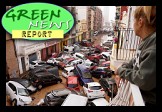 'Green News Report' 10/31/24
'Green News Report' 10/31/24 'Closing Arguments'with Digby and Driftglass: 'BradCast' 10/30/24
'Closing Arguments'with Digby and Driftglass: 'BradCast' 10/30/24 Trump Promises to be a Lawless, Authoritarian President. Believe Him: 'BradCast' 10/29/24
Trump Promises to be a Lawless, Authoritarian President. Believe Him: 'BradCast' 10/29/24 'Green News Report' 10/29/24
'Green News Report' 10/29/24 Ballots Burn, Billionaires 'Obey in Advance', Callers Ring In: 'BradCast' 10/28/24
Ballots Burn, Billionaires 'Obey in Advance', Callers Ring In: 'BradCast' 10/28/24 Musk's Privatized Internet Satellite System Threatens U.S. National Security
Musk's Privatized Internet Satellite System Threatens U.S. National Security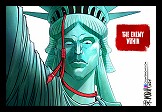 Sunday 'VOTE NOW!' Toons
Sunday 'VOTE NOW!' Toons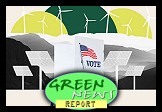 'Green News Report' 10/24/24
'Green News Report' 10/24/24 Harris on Hope, Trump's Fasc-ism in Bumpy Closing Days: 'BradCast' 10/24/24
Harris on Hope, Trump's Fasc-ism in Bumpy Closing Days: 'BradCast' 10/24/24 Kelly: Trump 'Fascist', Admires Hitler, Disrespects Law: 'BradCast' 10/23/24
Kelly: Trump 'Fascist', Admires Hitler, Disrespects Law: 'BradCast' 10/23/24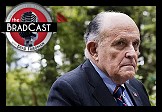 Accountability Comes For Rudy, Other Election Deniers: 'BradCast' 10/22/24
Accountability Comes For Rudy, Other Election Deniers: 'BradCast' 10/22/24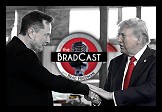 Elon Musk's 'Vote Buying' and Lying for Trump: 'BradCast' 10/21/24
Elon Musk's 'Vote Buying' and Lying for Trump: 'BradCast' 10/21/24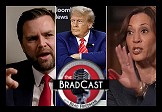 Fake v. Real Censorship and Trump/Fox Fetish-ized Grievance World: 'BradCast' 10/17/24
Fake v. Real Censorship and Trump/Fox Fetish-ized Grievance World: 'BradCast' 10/17/24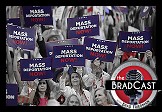 'Americans Aren't Prepared for Trump's Police State': 'BradCast' 10/16/24
'Americans Aren't Prepared for Trump's Police State': 'BradCast' 10/16/24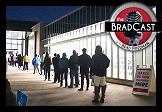 Good News for Georgia Voters, the Economy and Kamala Harris: 'BradCast' 10/15/24
Good News for Georgia Voters, the Economy and Kamala Harris: 'BradCast' 10/15/24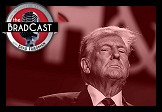 Fascism Comes to America: 'BradCast' 10/14/24
Fascism Comes to America: 'BradCast' 10/14/24
 VA GOP VOTER REG FRAUDSTER OFF HOOK
VA GOP VOTER REG FRAUDSTER OFF HOOK Criminal GOP Voter Registration Fraud Probe Expanding in VA
Criminal GOP Voter Registration Fraud Probe Expanding in VA DOJ PROBE SOUGHT AFTER VA ARREST
DOJ PROBE SOUGHT AFTER VA ARREST Arrest in VA: GOP Voter Reg Scandal Widens
Arrest in VA: GOP Voter Reg Scandal Widens ALL TOGETHER: ROVE, SPROUL, KOCHS, RNC
ALL TOGETHER: ROVE, SPROUL, KOCHS, RNC LATimes: RNC's 'Fired' Sproul Working for Repubs in 'as Many as 30 States'
LATimes: RNC's 'Fired' Sproul Working for Repubs in 'as Many as 30 States' 'Fired' Sproul Group 'Cloned', Still Working for Republicans in At Least 10 States
'Fired' Sproul Group 'Cloned', Still Working for Republicans in At Least 10 States FINALLY: FOX ON GOP REG FRAUD SCANDAL
FINALLY: FOX ON GOP REG FRAUD SCANDAL COLORADO FOLLOWS FLORIDA WITH GOP CRIMINAL INVESTIGATION
COLORADO FOLLOWS FLORIDA WITH GOP CRIMINAL INVESTIGATION CRIMINAL PROBE LAUNCHED INTO GOP VOTER REGISTRATION FRAUD SCANDAL IN FL
CRIMINAL PROBE LAUNCHED INTO GOP VOTER REGISTRATION FRAUD SCANDAL IN FL Brad Breaks PA Photo ID & GOP Registration Fraud Scandal News on Hartmann TV
Brad Breaks PA Photo ID & GOP Registration Fraud Scandal News on Hartmann TV  CAUGHT ON TAPE: COORDINATED NATIONWIDE GOP VOTER REG SCAM
CAUGHT ON TAPE: COORDINATED NATIONWIDE GOP VOTER REG SCAM CRIMINAL ELECTION FRAUD COMPLAINT FILED AGAINST GOP 'FRAUD' FIRM
CRIMINAL ELECTION FRAUD COMPLAINT FILED AGAINST GOP 'FRAUD' FIRM RICK SCOTT GETS ROLLED IN GOP REGISTRATION FRAUD SCANDAL
RICK SCOTT GETS ROLLED IN GOP REGISTRATION FRAUD SCANDAL VIDEO: Brad Breaks GOP Reg Fraud Scandal on Hartmann TV
VIDEO: Brad Breaks GOP Reg Fraud Scandal on Hartmann TV RNC FIRES NATIONAL VOTER REGISTRATION FIRM FOR FRAUD
RNC FIRES NATIONAL VOTER REGISTRATION FIRM FOR FRAUD EXCLUSIVE: Intvw w/ FL Official Who First Discovered GOP Reg Fraud
EXCLUSIVE: Intvw w/ FL Official Who First Discovered GOP Reg Fraud GOP REGISTRATION FRAUD FOUND IN FL
GOP REGISTRATION FRAUD FOUND IN FL


































